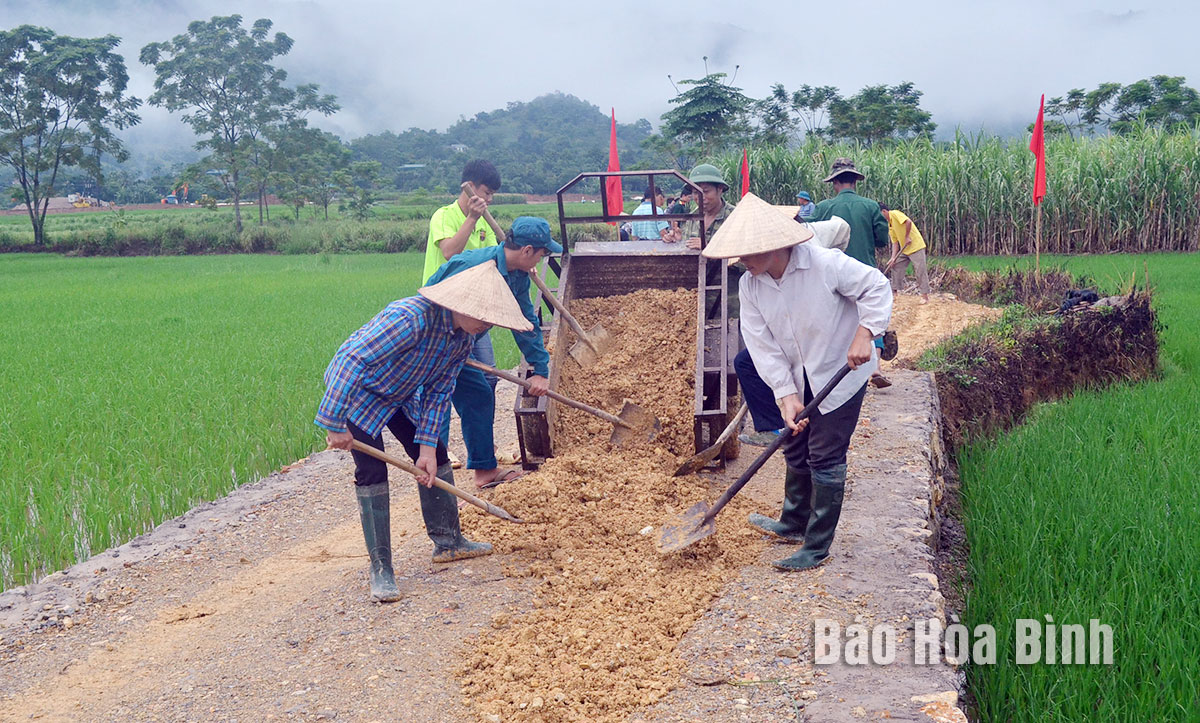
Up to now, Kim Boi district has 6 out of the16 communes meeting the standards of the new rural areas including communes: Nam Thuong, Sao Bay, Vinh Dong, My Hoa, Dong Bac, Vinh Tien (reaching 37.5%); no communes are meeting the standards of the advanced or model rural areas.

Kim Boi district has determined to focus the
resources to complete the essential infrastructure for the communes trying to
reach the goal of the new rural areas in the period of 2021 - 2025 (In the
photo: The investment in repairing and upgrading in-field traffic in Sao Bay
commune).
According to the planned targets assigned by the
Provincial People's Committee, by the end of 2025, 10 communes are meeting the
standards of the new rủal areas in Kim Boi district, accounting for 62.5% of
the total number of the communes in the region; 4 out of the 16 communes
meeting the advanced rural standards (accounting for 25%); 1 out of the 16
communes meeting the standards of the model rural areas (accounting for 6.25%).
However, according to the District People's Committee, during the
implementation process, there are many difficulties, especially in the
resources to implement the infrastructure criteria for the communes trying to
reach the finish line. Through reviewing and assessing the actual needs, the
District’s People's Committee has proposed that the Provincial People's
Committee consider and support funding for implementing 5 projects with a total
estimated capital of 38.9 billion VND. These are the essential infrastructure
projects, making an important contribution to the district completing its
investment plan for the communes trying to achieve the standards of the new
rural areas, the advanced and model rural areas in the period of 2021 - 2025.
The Standing Board of the Hoa Binh provincial Party Committee has agreed in principle on a proposal by the Standing Board of the Party Committee of Hoa Binh city to gather feedback on the city’s 1:2000 zoning plan, which forms part of its broader urban development strategy.
Hoa Binh province has made notable progress in public administration reform and digital government development, with the satisfaction index among citizens and businesses reaching over 84%, according to recent government evaluations.
Thanks to great efforts by local authorities in recent times, the governance and public administration performance of Mai Chau district has been significantly improved.
In the afternoon of June 6, the Party Committee, the People's Council, the People's Committee and the Fatherland Front of Lac Son district solemnly held a meeting to celebrate the 139th anniversary of the district's founding (1886–2025) and the 79th anniversary of the establishment of the district's Party Committee (1946–2025). There was the attendance of Mr. Bui Van Thang, the Vice Chairman of the Provincial People's Council; Mr. Quach Tat Liem, the Vice Chairman of the Provincial People's Committee; Ms. Dang Bich Ngoc, the Deputy Head of the National Assembly Delegation of the province; as well as the former leaders of the province and district through various periods, who are the natives of the district.
Implementing the Politburo’s Resolution No. 57-NQ/TW on breakthroughs in science – technology, innovation, and digital transformation is a golden opportunity for the northern mountainous province of Hoa Binh to renew growth model, improve competitive edge and shorten digital gap.
Resolution 57-NQ/TW, issued by the Politburo on December 22, 2024, identifies sci-tech, innovation, and digital transformation as strategic breakthroughs to build a developed and prosperous nation. In Hoa Binh province, this spirit is not just a slogan, it’s being put into action through concrete initiatives that form a "new development triangle”: digital citizenship, digital economy, and digital administration.



